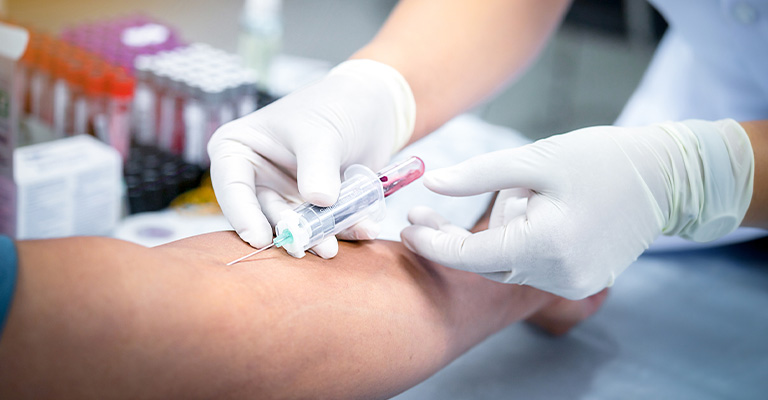Updated by the Progyny Clinical Team — July 2025.
There are many blood tests that can help find out if you or your partner have any health issues that are contributing to infertility.
You should both have a full physical exam with a reproductive endocrinologist (REI) if you’re trying to conceive with a partner of the opposite sex and:
- You’re younger than 35 and haven’t been able to get pregnant after one year of well-timed intercourse without birth control.
- You’re 35 or older and haven’t been able to get pregnant after six months of well-timed intercourse without birth control.
- You have irregular periods (your cycle is shorter than 25 days, longer than 35 days, or you miss periods).
Blood tests
Anti-Müllerian hormone
Anti-Müllerian hormone (AMH) has quickly become an important test in fertility blood tests. Made by small cells in the ovary that surround the eggs, AMH is present until you reach menopause.
Testing AMH gives your REI a good understanding of your egg supply. This test can be done any time in your cycle, even if you take birth control pills. It’s an important test for those pursuing in vitro fertilization (IVF). That’s because lower AMH levels often lead to fewer eggs collected during IVF, which can reduce the chances of success. Many people with low AMH are still able to conceive spontaneously. If you have a low AMH level, talk with your gynecologist or REI.
Follicle-stimulating hormone
Follicle-stimulating hormone (FSH) is an important hormone for menstrual cycle regulation. It helps stimulate the growth of follicles, which contain eggs, in the ovaries. The blood test is done on the second or third day of your cycle. It’s used to measure your egg count and how your ovaries are functioning.
A high FSH level can be a sign of diminished ovarian reserve (DOR) or menopause. DOR is when you have fewer eggs left in your ovaries compared to others your age.
FSH testing can help differentiate between disorders like premature ovarian insufficiency or polycystic ovarian syndrome (PCOS).
FSH also regulates the production and transportation of sperm. The test is sometimes used to determine if proper sperm production is occurring.
Estradiol
Estradiol is an important form of estrogen. This test is used to measure how your ovaries are functioning and to evaluate the quality of your eggs. Like FSH, it is done on the second or third day of your cycle and helps your providers interpret and understand FSH results.
Luteinizing hormone
Luteinizing hormone (LH) helps control egg development. An LH test performed at the beginning of your cycle may help diagnosis hormonal imbalances, like PCOS. When testing is performed midway through your menstrual cycle, day 14 of a 28-day cycle, the level can help show when you’re ovulating.
LH also stimulates the testosterone hormone that affects sperm production. This test may be useful in evaluating male-factor infertility.
Progesterone
Progesterone is a hormone produced by the ovaries during and after ovulation. It prepares the uterine lining for implantation of an embryo.
A serum progesterone test can help to show whether or not you’re ovulating. Since progesterone levels increase towards the end of a cycle, the test is done just before your period starts, typically on day 21 of a 28-day cycle.
Prolactin
Prolactin is made by the pituitary gland and causes milk production. A high prolactin level can contribute to anovulation (inability to ovulate) and infertility.
For those with ovaries, a test may be performed:
- In the evaluation of infertility.
- To determine why they aren’t ovulating.
- If there are symptoms, such as nipple discharge.
For those with sperm, a test is done:
- When there is a lack of sexual desire.
- When there is difficulty getting an erection.
- If there might be a problem with the pituitary gland.
Androgens
Testosterone is probably the most well-known androgen, and it affects the sexual functioning of every person.
An androgen test is used in the evaluation of certain health conditions that affect fertility like PCOS. It’s also used to find the cause of a low sex drive and the inability to get an erection, or to help diagnose male factor infertility.
If you have questions or concerns, Progyny is here for you. Please contact your Progyny Care Advocate for support.
Recommended video
In this 5-minute video, Dr. Sara Arian from Boston IVF explains several blood tests used to help determine if there is a problem causing infertility.
Disclaimer: The information provided by Progyny is for educational purposes only and is not medical advice. Always consult a qualified healthcare provider for medical guidance.
